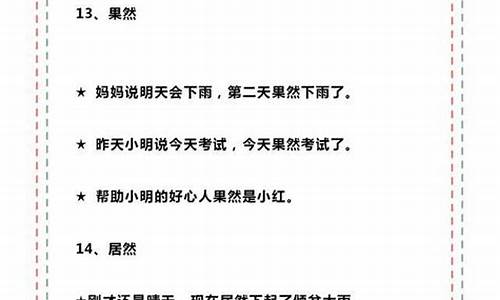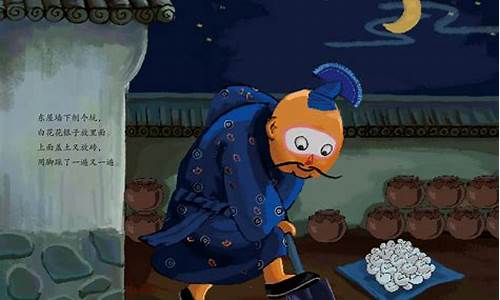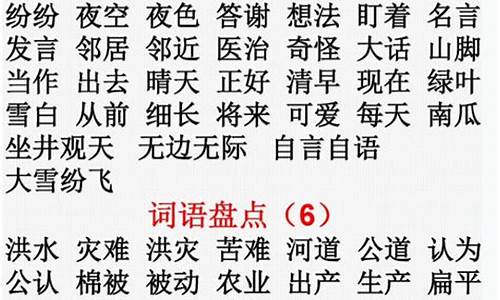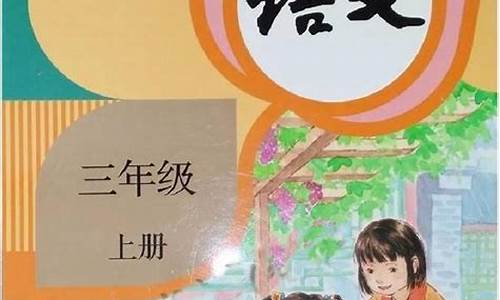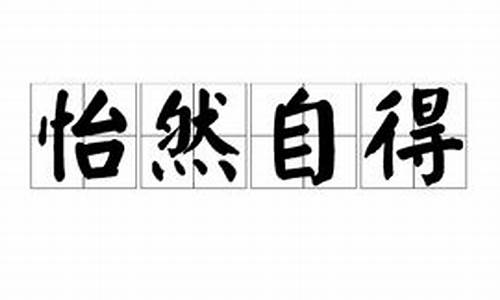对于成语故事英语演讲五分钟左右的问题,我有一些了解和研究,也可以向您推荐一些专业资料和研究成果。希望这对您有所帮助。
1.英语成语故事:黔驴技穷
2.用英语翻译成语故事
3.用英语写一个成语故事
4.守株待兔成语故事英文版?
5.大家帮忙写两个英文的短文。翻译两篇成语故事,别太长,每篇三百词左右,汉语英语都要
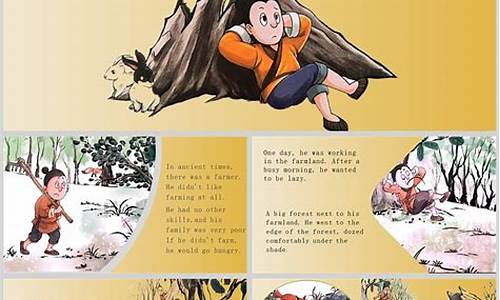
英语成语故事:黔驴技穷
In ancient times there were no donkeys in Guizhou province. Somebody brought a donkey from somewhere and tied it to a tree at the foot of a mountain.
A tiger saw the donkey, and thought that it must be a fearsome(可怕的) monster. It hide behind a tree and spied on the donkey.
When the donkey brayed(叫) , the tiger was frightened, thinking that the donkey was about to devour(吞食,毁灭) it. After a while, seeing that the donkey had not moved, the tiger approached it and teased it. The donkey became angry, and kicked the tiger.
The tiger thought to itself: "Its then all it is capable of?" It then jumped on the donkey and ate it.
This idiom is used to mean that one has exhauseted one's skills.
过去贵州(黔)这个地方没有驴。有个多事的人用船运来了一头驴,运来后却没有什么用处,就把驴放到山脚下。
一只老虎看见了驴,以为这个躯体高大的家伙一定很神奇,就躲在树林里偷偷观察着,后来又悄悄走出来,小心翼翼地接近驴,不知道驴子的底细。
有一天,驴叫了一声,大虎大吃一惊,远远躲开,以为驴要咬自己了,非常恐惧。然而,老虎反复观察以后,觉得驴并没有什么特殊本领,而且越来越熟悉驴的叫声了。老虎开始走到驴的前后,转来转去,还不敢上去攻击驴。以后,老虎慢慢逼近驴,越来越放肆,或者碰它一下,或者靠它一下,不断冒犯它。驴非常恼怒,就用蹄子去踢老虎。
老虎心里盘算着:“你的本事也不过如此罢了!”非常高兴。于是老虎腾空扑去,大吼一声,咬断了驴的喉管,啃完了驴的肉,才离去了。
唉!那驴的躯体高大,好像有德行;声音洪亮,好像有本事。假如不显出那有限的本事,老虎虽然凶猛,也会存有疑虑畏惧的心理,终究不敢攻击它。现在落得如此下场,不是很可悲吗?
用英语翻译成语故事
守株待兔
One day a farmer was working in the field .
suddenly a hare carched
into a tree ,it fell to the
ground and died.The
farmer was happy.
He took it back home
and cooked it.from the
on ,the farmer stopped
working.And waited for
another hare.But another hare never come.So the farmer had
nothing to eat.
用英语写一个成语故事
以下就是这篇成语故事的标准翻译了 !
Zu Ti and Liu Kun Jin Dynasty are the famous generals, two like-minded, gas intended congenial, have hope that it will contribute to dry out a career. Yamen where they worked together during the day, together build a quilt at night to sleep. Middle of the night the day, Zu Ti was awakened by the distance came the sounds of chickens, they then kicked awake Liu Kun, said: "The chicken sounds you hear it?" Liu Kun ear to listen carefully for a while and said: "Yes ah is the chicken in the sing. However, the chicken middle of the night calls is bad sound ah! "Zuti side got up on the one hand opposed it, saying:" This is not a bad sound, but urged us to quickly get up and exercise sounds. "Liu Kun follow the dress get out of bed. They came to the yard, pull out the sword to the dance,
Until the first light of dawn.
Later, Zu Ti and Liu Kun have to make every effort to recover the North made its own contribution.
守株待兔成语故事英文版?
Enjoy a story
A big tiger caught a fox in a forest. When the tiger wanted to eat it, the fox said, “You mustn't eat me. I was sent by Heaven to rule the animals. By eating me, you will violate(违抗)the command of Heaven. If you don't believe me, just follow me to see whether the animals are afraid of me.” The tiger agreed, and followed the fox as it walked around the forest. The animals all ran away on seeing them. The tiger thought they were afraid of the fox, so he let it go. He didn't realize that it was him that the beasts(百兽)were really afraid of.
成语为: 狐假虎威
大家帮忙写两个英文的短文。翻译两篇成语故事,别太长,每篇三百词左右,汉语英语都要
⑴ 守株待兔的成语故事守株待兔成语故事:
相传在战国时代宋国,有一个农民,日出而作,日入而息.遇到好年景,也不过刚刚吃饱穿暖;一遇灾荒,可就要忍饥挨饿了.他想改善生活,但他太懒,胆子又特小,干什么都是又懒又怕,总想碰到送上门来的意外之财。
奇迹终于发生了。深秋的一天,他正在田里耕地,周围有人在打猎。吆喝之声四处起伏,受惊的小野兽没命的奔跑。突然,有一只兔子,不偏不倚,一头撞死在他田边的树根上。当天,他美美地饱餐了一顿。
从此,他便不再种地。一天到晚,守着那神奇的树根,等着奇迹的出现。
成语“守株待兔”,比喻亡想不劳而得,或死守狭隘的经验,不知变通。
(1)守株待兔成语故事英文版扩展阅读
守株待兔
成语拼音:shǒu zhū dài tù
成语解释:比喻死守狭隘经验;不知变通;或抱着侥幸心理妄想不劳而获。
成语出处:战国 韩韩非《韩非子五蠹》:“宋人有耕田者,田中有株,兔也,触柱折颈而死。”
成语用法:守株待兔连动式;作宾语、定语;含贬义。
成语正音:待,不能读作“dǎi”。
成语辨形:待,不能写作“侍”。
成语辨析:守株待兔和“刻舟求剑”;都含有“不知变通”之意。但守株待兔重在“守”和“待”;形容人不作主观努力;只是存在侥幸心理;想获得意外成功;而“刻舟求剑”偏重于“刻”和“求”;强调虽然主观上努力;但不了解情况变化;不知变通而采取错误方法。
近义词:刻舟求剑、墨守成规
反义词:通达权变
成语例子:吾料兄必定出身报国,岂是守株待兔之辈。(明许仲琳《封神演义》第九十四回)
⑵ 成语故事《守株待兔》动画
成语: 守株待兔
拼音: shǒu zhū dài tù
解释: 株:露出地面的树根。原比喻希图不经过努力而得到成功的侥幸心理。现也比喻死守狭隘经验,不知变通。
出处: 《韩非子·五蠹》记载:战国时宋国有一个农民,看见一只兔子撞在树根上死了,便放下锄头在树根旁等待,希望再得到撞死的兔子。
举例造句: 吾料兄必定出身报国,岂是守株待兔之辈! 明·许仲琳《封神演义》第九十四
拼音代码: szdt
近义词:刻舟求剑、墨守成规
反义词: 通达权变
灯谜: 柳
用法: 作宾语、定语;指不知变通
英文: stand by a stump waiting for more hares to e and clash themselves against it--trust to chance and windfalls
故事: 从前宋国有一个农夫在地里干活,忽然从远处跑来一只兔子,它十分慌张,一不小心就撞在树桩上死了。农夫很高兴,捡起这只死兔子回家美美地饱餐一顿。他想每天都有这样的好事就好了,于是他放下农具整天守在那颗树下,一无所获
动画网址网页链接
⑶ 英语版中国成语故事
江郎才尽
Southern Dynasties of Jiang Yan, word Wen-tung, when he was young, became a Dingdingyouming writer, his poems and articles at the time received high acclaims. However, when he is getting older, he has not previously written an article good, but a lot of setbacks. His poems written in prosaic; and pick up a pen-yin grip for a long time, still can not write a word, the occasional inspiration came; poem written, but the textual Kuse, content, plain were pletely useless. So some people to legend, once a boat parked in Chan Jiang Yan-Ling Monastery river and dream of a self-named Zhang Jingyang person; to his followers repay a silk, he would arrest a few feet from her, he is also silk. Thus, his article there will be no wonderful. It was also legend; once the rule of Jiang Yan in the booth sleeping too; dreamed that a person claiming to Guo Pu, walked over to his side, his claim to the pen, said to him: "Man Michie, I have a pen in your place has been a long time, and now should be able to give it to me the bar! "Jiang Yan heard, they dig out from his arms, he is also a five-color pen. Reportedly Since then, Jiang Yan on Evans exhausted and could not write the article in any good.
Jiang Yan's talent has not really run out, but he was an officer after the one hand, as the Chief busy, on the other hand also because of career proud of, without their own write, to sweat, they did not write the. Over time, the article will bring out less, lacking in talent. (Excerpt from "Practical Writing" 1995 No. 8 "I hope," Jiang "was not exactly")
南朝的江淹,字文通,他年轻的时候,就成为一个鼎鼎有名的文学家,他的诗和文章在当时获得极高的评价。 可是,当他年纪渐渐大了以后,他的文章不但没有以前写得好了,而且退步不少。他的诗写出来平淡无奇;而且提笔吟握好久,依旧写不出一个字来,偶尔灵感来了;诗写出来了,但文句枯涩,内容 平淡得一无可取。于是就有人传说,有一次江淹乘船停在禅灵寺的河边,梦见一 个自称叫张景阳的人;向他讨还一匹绸缎,他就从怀中拘出几尺绸缎还他。因此,他的文章以后便不精彩了。又有人传说;有一次江淹在冶亭中睡午觉;梦见一个自称郭璞 的人,走到他的身边,向他索笔,对他说:“文通兄,我有一支笔在你那儿已经很久了,现在应该可以还给我了吧!” 江淹听了,就顺手从怀里取出一支五色笔来还他。据说从此以后,江淹就文思枯竭,再也写不出什么好的文章了。
其实并不是江淹的才华已经用完了,而是他当官以后,一方面由于政务繁忙,另一方面也由于仕途得意,无需自己动笔,劳心费力,就不再动笔了。久而久之,文章自然会逐渐逊色,缺乏才气。(节选自《应用写作》1995年第8期《但愿“江郎”才不尽》)
⑷ 守株待兔成语故事350字
守株待兔
宋国有个农夫种着几亩地,他的地头上有一棵大树,
守株待兔的成语故事
。一天,他在地里干活,忽然看见一只兔子箭一般地飞奔过来,猛的撞在那棵大树上,一下子把脖子折断了,蹬蹬腿就死了。这个农夫飞快的跑过去,把兔子捡起来,高兴地说:“这真是一点劲没费,白捡了个大便宜,回去可以美美地吃上一顿了。”他拎着兔子一边往家走,一边得意地想:“我的运气真好, 没准明天还会有兔子跑来,我可不能放过这样的便宜。” 第二天,他到地里,也不干活,只守着那棵大树,等着兔子撞过来。结果,等了一天什么也没等到。他却不甘心,从此,天天坐在那棵大树下等着兔子来撞死。他等呀等呀,直等到地里的野草长得比庄稼都高了,连个兔子影也没有再见到。
⑸ 守株待兔的成语故事(50——100字左右)
从前宋国有一个农夫在地里干活,忽然从远处跑来一只兔子,它十分慌张,一不小心就撞在树桩上死了。农夫很高兴,捡起这只死兔子回家美美地饱餐一顿。他想每天都有这样的好事就好了,于是他放下农具整天守在那颗树下,一无所获。
(5)守株待兔成语故事英文版扩展阅读
守株待兔
成语拼音:shǒu zhū dài tù
成语解释:比喻死守狭隘经验;不知变通;或抱着侥幸心理妄想不劳而获。
成语出处:战国 韩韩非《韩非子五蠹》:“宋人有耕田者,田中有株,兔也,触柱折颈而死。”
成语用法:守株待兔连动式;作宾语、定语;含贬义。
成语正音:待,不能读作“dǎi”。
成语辨形:待,不能写作“侍”。
成语辨析:守株待兔和“刻舟求剑”;都含有“不知变通”之意。但守株待兔重在“守”和“待”;形容人不作主观努力;只是存在侥幸心理;想获得意外成功;而“刻舟求剑”偏重于“刻”和“求”;强调虽然主观上努力;但不了解情况变化;不知变通而采取错误方法。
近义词:刻舟求剑、墨守成规
反义词:通达权变
成语例子:吾料兄必定出身报国,岂是守株待兔之辈。(明许仲琳《封神演义》第九十四回)
⑹ 现代版成语故事《守株待兔》
守株待兔
shǒu zhū dài tù
解释株:露出地面的树根。原比喻希图不经过努力而版得到成功的侥幸心权理。现也比喻死守狭隘经验,不知变通。
出处《韩非子·五蠹》记载:战国时宋国有一个农民,看见一只兔子撞在树根上死了,便放下锄头在树根旁等待,希望再得到撞死的兔子。
结构连动式。
用法用作贬义。一般作宾语、定语。
正音待;不能读作“dǎi”。
辨形待;不能写作“侍”。
近义词刻舟求剑、墨守成规
反义词通达权变
辨析~和“刻舟求剑”;都含有“不知变通”之意。但~重在“守”和“待”;形容人不作主观努力;只是存在侥幸心理;想获得意外成功;而“刻舟求剑”偏重于“刻”和“求”;强调虽然主观上努力;但不了解情况变化;不知变通而采取错误方法。
例句美好的生活要靠自己去创造;这样如同~;能有好日子过吗?
英译waitfainswithoutpains
⑺ 中英文版成语故事书。
广州市北京路科技图书馆有得卖!成语典故
⑻ 守株待兔 成语故事 贝瓦
守株待兔 shǒu zhū dài tù
解释: 株:露出地面的树根。原比喻希图不经过努力而得到成功的侥幸心理。现也比喻死守狭隘经验,不知变通。
成语故事:
春秋时代有位宋国的农夫,他每天早上很早就到田里工作,一直到太阳下山才收拾农具准备回家。有一天,农夫正在田里辛苦的工作,突然却远远跑来一只兔子。这只兔子跑得又急又快,一个不小心,兔子撞上稻田旁边的大树,这一撞,撞断了兔子的颈部,兔子当场倒地死亡。一旁的农夫看到之后,急忙跑上前将死了的兔子一手抓起,然后很开心的收拾农具准备回家把这只兔子煮来吃。农夫心想,天底下既然有这么好的事,自己又何必每天辛苦的耕田?
从此以后,他整天守在大树旁,希望能再等到不小心撞死的兔子。可是许多天过去了,他都没等到撞死在大树下的兔子,反而因为他不处理农田的事,因此田里长满了杂草,一天比一天更荒芜。
⑼ 小学一年级英汉双译成语故事:守株待兔
成语故事:宋国有个农夫正在田里翻土。突然,他看见有一只野兔从旁边的草丛里慌慌张张地窜出来,一头撞在田边的树墩子上,便倒在那儿一动也不动了。农民走过去一看:兔子死了。因为它奔跑的速度太快,把脖子都撞折(shé)了。农民高兴极了,他一点力气没花,就白捡了一只又肥又大的野兔。他心想;:要是天天都能捡到野兔,日子就好过了。从此,他再也不肯出力气种地了。每天,他把锄头放在身边,就躺在树墩子跟前,等待着第二只、第三只野兔自己撞到这树墩子上来。世上哪有那么多便宜事啊。农民当然没有再捡到撞死的野兔,而他的田地却荒芜了。因为没能再次得到兔子,农民自己沦为了宋国的笑柄。
英文翻译
During the period of Warring States, many people lived on farming. One day, a farmer found that a hare bumped against a stump and died because it ran so quickly that it did not see the stump. That a hare bumped into the sump was less likely to happen again. However, the farm chose to sit near the stump, waiting for another hare, instead of farming to make a living. Eventually, the farmer starved to death.
Waiting for him
守株待兔
A farm wanted to eat good food every day, but he didn’t like working. He often went to other farmer’s homes. When they ate1, he ate with them, so the farms didn’t like him.
有一个农夫每天都想着吃好吃的东西,但是他却不喜欢劳动。他经常去别人家,如果赶上别人正在吃饭,他就和别人一块吃,所以农夫们都不喜欢他。
One day, he saw a hare running down the hill. The hare knocked against2 a tree in his field, broke its neck and fell dead. The farmer was so happy. “Great!” he went to the tree and got the dead hare, and went home with it.
一天,他看见一只野兔从山上跑下来。野兔他田里的一棵树上,折断脖子死了。农夫太高兴了。“太好了!”他走过去捡起了野兔就回家了。
That day, he ate a lot. He thought that the meat of the hare was very nice. The next day, he put down3 his hoe, and waited by the tree for a second hare to turn up4. He waited all day long, but no hare come at all.
那天,他吃了很多饭。他觉得野兔的肉太好吃了。第二天,他放下锄头,在树旁等第二个野兔出现。他整整等了一天,但是根本没有野兔来。
点睛:总想不劳而获的人,最终什么也得不到。
注释:1. ate 吃。他是eat的过去式,这是一个变化不规则的动词,他的过去分词是:eaten
2. knock against 碰撞
例:He walked and thought something, suddenly he knocked against a wall.
他一边走一边思考事情,突然,撞到了一面墙上。
3. put down 放下
例:Put down the gun. 把枪放下。
4. turn up 出现
例:I hope the book I lost will turn up. 我希望丢掉的那本书能再出现。
turn 构成的短语还有 turn on 打开;turn off 关上;turn down调低;turn in递交等等
好了,今天关于“成语故事英语演讲五分钟左右”的话题就讲到这里了。希望大家能够通过我的介绍对“成语故事英语演讲五分钟左右”有更全面、深入的认识,并且能够在今后的实践中更好地运用所学知识。



